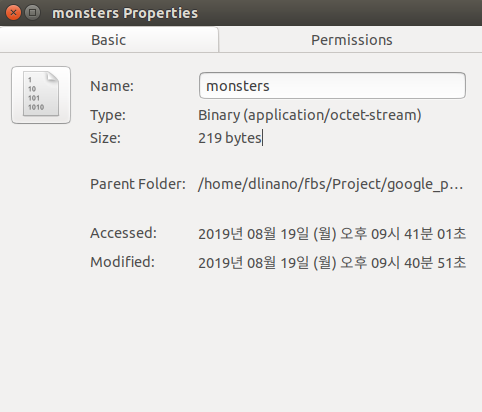Google Protocol Buffer3
Google Protocol Buffer3
Google Protocol Buffer3에 대해 자세히 알아보기 전에 한가지 문제에 대해 알아보자.
Structured Data를 어떻게 Serilalize 하고 Retrieve할수 있을까?
Google Protocol Buffer3를 사용하기 이전에는 다음과 같은 방법과 그러한 방법에 대한 단점이 있다.
기존 방식 3가지
| 방법 | 특징 |
| Python pickling |
|
| Encode the data items into a Single String |
|
| XML |
|
Google Protocol Buffer3는 프로토콜 버퍼 데이터의 자동 인코딩 및 구문 분석을 구현하는 클래스를 만들어서 접근 가능
Getter 와 Setter를 제공하고 프로토콜 버퍼를 단위로 읽고 쓰는 세부사항 처리 가능
직렬화 데이터 구조(Serialized Data Structure)를 C++, C#, Java, Python등 다양한 언어를 지원하며 특히 직렬화 속도가 빠르고 파일의 크기가 작다.
구조 및 사용 방법
프로토콜 버퍼를 사용하기 위해서는 저장하기 위한 데이터형을 proto file이라는 형태로 정의한다.
proto file의 특징은 특정 언어에 종속성이 없는 형태로 데이터 타입을 정의한다는 것이다.
이렇게 정의된 데이터 타입을 프로그래밍 언어에 사용하려면, 해당 언어에 맞는 클래스로 생성해야 한다.
protoc 컴파일러로 proto file을 컴파일 하면, 각 언어에 맞는 형태의 데이터 클래스 파일을 생성해 준다.

Proto file
.proto file은 각 Field에 대한 Name과 Type으로 지정된다.
아래와 같은 예시를 살펴보고 이것에 대한 내용을 정리한다.
syntax = "proto3";
package MyGame.Sample;
message Monster {
Vec3 pos = 1;
int32 mana = 2;
int32 hp = 3;
string name = 4;
bool friendly = 5;
repeated int32 inventory = 6;
Color color= 7;
repeated Weapon weapons =8;
Equipment equipped =9;
repeated Vec3 path =10;
enum Color{
Red = 0;
Green = 1;
Blue = 2;
}
}
message Vec3{
float x = 1;
float y = 2;
float z = 3;
}
message Equipment{
repeated Weapon weapon = 1;
}
message Weapon{
string name = 1;
int32 damage = 2;
}
message AddressMonster{
repeated Monster monster = 1;
}
.proto file 정의 방법
1) Package: 다른 프로젝트 간의 이름 충돌 방지
Python 에서 패키지는 일반적으로 디렉토리 구조에 영향을 받으니 파이썬이 아닌 언어에서 Name Space충돌을 피하기 위하여 선언
2) Message: Field의 집합
3) Type
| .proto Type | Python Type |
| double | float |
| float | float |
| int32 | int |
| int64 | int/long |
| unit32 | int/long |
| unit64 | int/long |
| sint32 | int |
| sint64 | int/long |
| fixed32 | int/long |
| fixed64 | int/long |
| sfixed32 | int |
| sfixed64 | int/long |
| bool | bool |
| string | str |
| bytes | bytes |
| 다른 message |
4) “=1”, “=2”, …
Unique한 Tag를 Field에 대입하는 과정이다.
- 1~15: Commonly used or repeate elements
- 16이상: loss-commonly used
5) Annotation of filed
- required: 반드시 Value필요
- optional: Value는 필요 없으면, Value를 정의안하면 Default value사용
- repeated: Scalar가아닌 Vector로서 표현
protoc(Compling Protocol Buffers)
.proto file을 해당 언어에 맞는 클래스로 Compile하는 과정
1) Compiler 설치: Download the Package
2) Compiler 실행:
protoc -I=$SRC_DIR --python_out=$DST_DIR $SRC_DIR/addressbook.proto
option을 활용하여 해당 언어어 맞는 클래스로서 Compile가능
실제 동작 Code
protoc -I=. --python_out=. monster.proto
실행 결과(monster.py)
1
2
3
4
5
6
7
8
9
10
11
12
13
14
15
16
17
18
19
20
21
22
23
24
25
26
27
28
29
30
31
32
import sys
_b=sys.version_info[0]<3 and (lambda x:x) or (lambda x:x.encode('latin1'))
from google.protobuf import descriptor as _descriptor
from google.protobuf import message as _message
from google.protobuf import reflection as _reflection
from google.protobuf import symbol_database as _symbol_database
from google.protobuf import descriptor_pb2
# @@protoc_insertion_point(imports)
_sym_db = _symbol_database.Default()
DESCRIPTOR = _descriptor.FileDescriptor(
name='monster.proto',
package='MyGame.Sample',
syntax='proto3',
serialized_pb=_b('\n\rmonster.proto\x12\rMyGame.Sample\"\xc3\x02\n\x07Monster\x12 \n\x03pos\x18\x01 \x01(\x0b\x32\x13.MyGame.Sample.Vec3\x12\x0c\n\x04mana\x18\x02 \x01(\x05\x12\n\n\x02hp\x18\x03 \x01(\x05\x12\x0c\n\x04name\x18\x04
...
AddressMonster = _reflection.GeneratedProtocolMessageType('AddressMonster', (_message.Message,), dict(
DESCRIPTOR = _ADDRESSMONSTER,
__module__ = 'monster_pb2'
# @@protoc_insertion_point(class_scope:MyGame.Sample.AddressMonster)
))
_sym_db.RegisterMessage(AddressMonster)
# @@protoc_insertion_point(module_scope)
Writing a Message
1) monster_pb2.Monster() 로서 monster 객체 생성
2) 객체의 입력받은 값 넣기
3) monster_pb2.AddressMonster()로서 monster추가
4) SerializeToString()을 통하여 문자열을 직렬화
아래 코드는 Protocol Buffer Class를 사용하여서 Monster를 등록하는 과정이다.
1
2
3
4
5
6
7
8
9
10
11
12
13
14
15
16
17
18
19
20
21
22
23
24
25
26
27
28
29
30
31
32
33
34
35
36
37
38
39
40
41
42
43
44
45
46
47
48
49
50
51
52
53
54
55
56
57
58
59
60
61
62
63
64
65
66
67
68
69
70
71
72
73
74
75
76
77
78
79
80
81
82
83
84
85
86
87
88
89
90
91
92
93
94
95
96
#!/usr/bin/env python
# coding: utf-8
import monster_pb2
import sys
try:
raw_input # Python 2
except NameError:
raw_input = input # Python 3
def PromptForMonster(monster):
monster.mana = int(raw_input("Enter monster mana: "))
monster.hp = int(raw_input("Enter monster hp: "))
monster.name = raw_input("Enter monster name: ")
monster.friendly = bool(raw_input("Enter monster friendly: "))
weapons =[]
while True:
weapon = raw_input("Enter a weapon name,dmage (or leave blank to finish): ")
if weapon == "":
break
name, damage = weapon.split(',')
imsi = [name, damage]
weapons.append(imsi)
monster_weapon = monster.weapons.add()
monster_weapon.name = name
monster_weapon.damage = int(damage)
monster_inven = []
while True:
inven = raw_input("Enter a inventory (or leave blank to finish): ")
if inven == "":
break
monster_inven.append(int(inven))
monster.inventory[:] = monster_inven
type = raw_input("Is this a Red, Green, or Blue? ")
if type == "Red":
monster.color = monster_pb2.Monster.Red
elif type == "Green":
monster.color = monster_pb2.Monster.Green
elif type == "Blue":
monster.color = monster_pb2.Monster.Blue
else:
print "Unknown Color type; leaving as default value."
pos = raw_input("Enter monster pos(x,y,z): ")
x,y,z = pos.split(',')
monster_pos = monster.pos
monster_pos.x = int(x)
monster_pos.y = int(y)
monster_pos.z = int(z)
while True:
path = raw_input("Enter a path(x,y,z) (or leave blank to finish): ")
if path == "":
break
x,y,z = path.split(',')
monster_path = monster.path.add()
monster_path.x = int(x)
monster_path.y = int(y)
monster_path.z = int(z)
equip = monster.equipped
for w in weapons:
equip.weapon.add(name=w[0],damage=int(w[1]))
if len(sys.argv) != 2:
print("Usage:", sys.argv[0], "SAVE_FILE_NAME")
sys.exit(-1)
address_monster = monster_pb2.AddressMonster()
try:
with open(sys.argv[1], "rb") as f:
address_monster.ParseFromString(f.read())
except IOError:
print(sys.argv[1] + ": File not found. Creating a new file.")
PromptForMonster(address_monster.monster.add())
with open(sys.argv[1], "wb") as f:
f.write(address_monster.SerializeToString())
실제 Input값
Monster1
| Variable | 실제값 |
| name | monster1 |
| mana | 10 |
| hp | 20 |
| friendly | True |
| Color | Red |
| Pos | 10, 20, 30 |
| weapons |
|
| inventory |
|
| path |
|
Monster2
| Variable | 실제값 |
| name | monster2 |
| mana | 100 |
| hp | 200 |
| friendly | False |
| Color | Green |
| Pos | 100, 200, 300 |
| weapons |
|
| inventory |
|
| path |
|
실행 결과

실행 결과 Binary File로서 저장되는 것을 알 수 있다.
Reading a Message
ParseFromString()을 통하여 문자열을 객체로서 접근 가능하게 한다.
아래 코드는 만들어진 Binary File을 읽는 과정이다.
1
2
3
4
5
6
7
8
9
10
11
12
13
14
15
16
17
18
19
20
21
22
23
24
25
26
27
28
29
30
31
32
33
34
35
36
37
38
39
40
41
42
43
44
45
46
47
48
#!/usr/bin/env python
# coding: utf-8
import monster_pb2
import sys
def ListMonster(address_monster):
for monster in address_monster.monster:
print("Monster pos: ",monster.pos.x, monster.pos.y, monster.pos.z)
print("Monster mana:", monster.mana)
print("Monster hp:", monster.hp)
print("Monster name:", monster.name)
print("Monster friendly:", monster.friendly)
print("Monster inventory: ")
for monster_inventory in monster.inventory:
print(monster_inventory)
print("Monster color: ",monster.color)
print("Monster weapon: ")
for w in monster.weapons:
print("Name: ",w.name)
print("Damage: ",w.damage)
print("Monster equipped")
for e in monster.equipped.weapon:
print(e)
print("Monster path:")
for p in monster.path:
print(p)
if len(sys.argv) != 2:
print("Usage:", sys.argv[0], "Save_FILE")
sys.exit(-1)
address_monster = monster_pb2.AddressMonster()
with open(sys.argv[1], "rb") as f:
address_monster.ParseFromString(f.read())
ListMonster(address_monster)
실행 결과
Monster pos: 10.0 20.0 30.0
Monster mana: 10
Monster hp: 20
Monster name: monster1
Monster friendly: True
Monster inventory:
1
2
3
Monster color: 0
Monster weapon:
Name: w1
Damage: 10
Name: w2
Damage: 20
Monster equipped
name: "w1"
damage: 10
name: "w2"
damage: 20
Monster path:
x: 1.0
y: 2.0
z: 3.0
x: 3.0
y: 2.0
z: 1.0
Monster pos: 100.0 200.0 300.0
Monster mana: 100
Monster hp: 200
Monster name: monster2
Monster friendly: True
Monster inventory:
3
2
1
Monster color: 1
Monster weapon:
Name: w3
Damage: 10
Name: w4
Damage: 20
Monster equipped
name: "w3"
damage: 10
name: "w4"
damage: 20
Monster path:
x: 10.0
y: 20.0
z: 30.0
x: 30.0
y: 20.0
z: 10.0
참조: 원본코드
참조: 조대협의 블로그
문제가 있거나 궁금한 점이 있으면 wjddyd66@naver.com으로 Mail을 남겨주세요.

Leave a comment